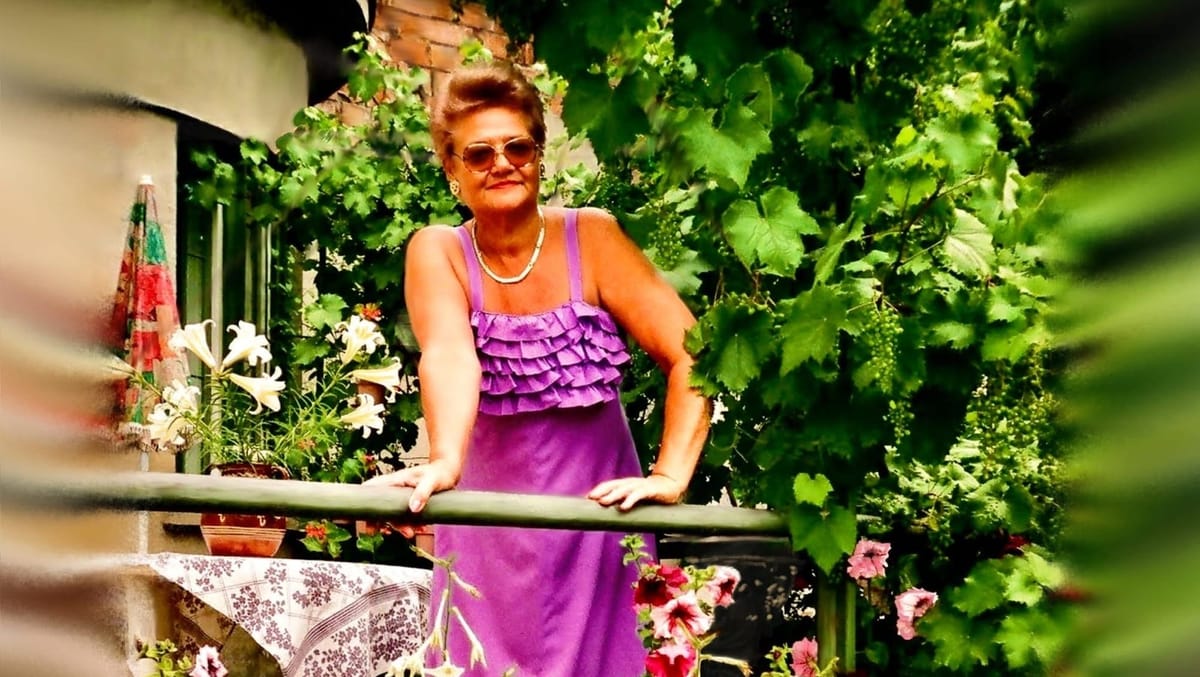Grape Vines and Basarabian Roots
🇷🇴(Romanian below + audio) With her big hats crowned with fresh flowers from her garden and her bright white dresses that fluttered like wings, she moved as if she were floating just above the ground, as if she were part angel, part queen from a realm lost to time.

In my memories, I can still see it—the way the sunbeams filtered through the grapevines and the heavy leaves of the tomato plants above my head, casting a dappled light that danced like tiny spirits on the earth below. There was magic in that garden, something more than the rich scent of soil and ripening fruit. It was as if the very air was woven from stories, whispers carried by the wind, secrets hidden in the folds of time.
And there, in the middle of it all, was my grandmother—a living legend. She was like a character from an old Romanian tale, stepping out of the pages and into life. Angela, they called her, though to me, she was more than a name. She seemed to possess a secret understanding of the world, a way of seeing beyond what was visible, sensing things no one else could sense. With her big hats crowned with fresh flowers from her garden and her bright white dresses that fluttered like wings, she moved as if she were floating just above the ground, as if she were part angel, part queen from a realm lost to time.
I remember how she would pause, mid-stride, to tell me stories of Bessarabia, of the days when she and her grandmother lived on the streets, stripped of everything but never of their spirit. She spoke of collecting snails by the river, but the way she told it, it felt like a quest from an old ballad—a journey of gathering not just food, but tiny treasures, small bits of life that kept them going. They would feed other orphans, other lost souls like themselves, and it was as if they were planting seeds of kindness that would grow long after they had moved on.
And always, by her side, was a boy named Pufulet. Pufulet, whose name meant "little puff"—a wisp of a boy, with hair like spun gold and a face that seemed to glow in the sunlight. He was like a forest sprite, darting through the grapevines, laughing with the kind of joy that could make you believe in miracles. My grandmother said he appeared one day, out of nowhere, barefoot and smiling, with a handful of wildflowers and eyes as wide as the Danube. He followed her like a shadow, and sometimes she’d say he was a good luck charm sent by her ancestors to watch over her. Other times, she’d laugh and say he was the spirit of the grapes themselves, sent to remind them that life could still be sweet.
There was an air of Bessarabian superstition about everything she did—a belief that the world was woven from threads of fate, spirits hiding in the trees, watching over or playing tricks. She taught me to leave breadcrumbs on the window sill for the “iele,” the playful, mischievous fairies who might grant you luck if you kept them happy. And she would whisper about the "Strigoi," the restless souls of the dead who needed prayers to find their way. She seemed to know a hundred little rituals, every one a charm against the dark, every one a tiny light in a world that could be so very vast and unknown.
Her home was filled with laughter and the sound of music. The chandelier in the dining room would sway slightly, as if moved by invisible hands, as the finest liquors and wines flowed on the antique table. Food was served in heaps, great mountains of dishes that never seemed to run out. My grandfather, Tata Misu, always at her side, with a heart as deep and loving as the sea, would toast to life, to love, to everything they had lost and everything they had found.
Sometimes, I would catch her in a quiet moment, her gaze far away, as if she were listening to something I couldn’t hear. I asked her once what she was thinking of, and she smiled, the way only she could—a smile that felt like the first warm sun of spring.
“I’m listening,” she said, “to the voices of the vines, to the stories they carry. Do you hear them, too, Pufulet?”
And I would nod, even though I wasn’t sure what I was hearing. But in those moments, under the sunbeams and the grapevines, I believed in the magic of it all, in the magic of her. I felt the mysteries of Basarabia, the myths and the dreams, the long-ago stories of the old country flowing through me like the rivers, winding and deep.
Now, when I close my eyes, I still see her there, laughing, dancing, weaving through the world like a spell. And I carry with me the treasures of their lives, those jewels of love and wisdom, those magical days under the sun, trying to share them with the world the way she would have wanted—with light, with laughter, with endless, unstoppable grace.
Romanian
TopÎn amintirile mele, încă o pot vedea – felul în care razele de soare treceau printre vițele de vie și frunzele grele ale plantelor de roșii deasupra capului meu, aruncând o lumină mozaicată care dansa ca niște spiriduși mici pe pământul de dedesubt. Era magie în acea grădină, ceva mai mult decât mirosul bogat al pământului și fructelor coapte. Era ca și cum însăși aerul era țesut din povești, șoapte purtate de vânt, secrete ascunse în cutele timpului.
Și acolo, în mijlocul tuturor, era bunica mea – o legendă vie. Era ca un personaj dintr-o veche poveste românească, ieșind din pagini și intrând în viață. Angela, așa o numeau, dar pentru mine era mai mult decât un nume. Părea să posede o înțelegere secretă a lumii, o modalitate de a vedea dincolo de ceea ce era vizibil, de a simți lucruri pe care nimeni altcineva nu le putea simți. Cu pălăriile ei mari împodobite cu flori proaspete din grădina ei și rochiile ei albe strălucitoare care fluturau ca niște aripi, se mișca de parcă ar fi plutit chiar deasupra pământului, de parcă ar fi fost parte înger, parte regină dintr-un tărâm pierdut în timp.
Îmi amintesc cum se oprea, în mijlocul drumului, să-mi povestească despre Basarabia, despre zilele în care ea și bunica ei trăiau pe străzi, lipsiți de tot, dar niciodată de spiritul lor. Vorbea despre cum adunau melci de pe malul râului, dar felul în care o spunea, părea o căutare dintr-o veche baladă – o călătorie de a aduna nu doar hrană, ci și mici comori, bucăți mici de viață care îi țineau în mișcare. Îi hrăneau pe ceilalți orfani, pe alte suflete pierdute ca ei, și era ca și cum plantau semințe de bunătate care ar fi crescut mult timp după ce ei plecau.
Și mereu, alături de ea, era un băiat. Era ca un spiriduș de pădure, strecurându-se printre vițele de vie, râzând cu o bucurie care te putea face să crezi în miracole. Bunica mea spunea că a apărut într-o zi, de nicăieri, desculț și zâmbind, cu un buchet de flori de câmp și cu ochii la fel de largi ca Dunărea. O urma ca o umbră și uneori spunea că era un talisman de noroc trimis de strămoșii ei să o vegheze. Alteori râdea și spunea că era spiritul strugurilor, trimis să le amintească că viața putea fi încă dulce.
Casa ei era plină de râsete și de sunetul muzicii. Candelabrul din sufragerie se legăna ușor, ca și cum ar fi fost mișcat de mâini invizibile, în timp ce cele mai fine băuturi și vinuri curgeau pe masa veche de lemn. Mâncarea era servită în grămezi mari, munți de bucate care păreau să nu se termine niciodată. Bunicul meu, Tata Misu, mereu lângă ea, cu o inimă adâncă și iubitoare ca marea, închina pentru viață, pentru dragoste, pentru tot ce au pierdut și tot ce au găsit.
Uneori, o prindeam într-un moment de liniște, privirea ei departe, de parcă ar fi ascultat ceva ce eu nu puteam auzi. Am întrebat-o odată la ce se gândea, și a zâmbit, așa cum numai ea putea – un zâmbet care părea ca primul soare cald al primăverii.
„Ascult,” a spus ea, „vocile vițelor de vie, poveștile pe care le poartă. Le auzi și tu, Aditzu?”
Și dădeam din cap, chiar dacă nu eram sigur ce auzeam. Dar în acele momente, sub razele de soare și vițele de vie, credeam în toată magia, în magia ei. Simțeam misterele Basarabiei, miturile și visele, poveștile de demult ale vechii țări care curgeau prin mine ca râurile, șerpuind și adânci.
Acum, când închid ochii, o văd încă acolo, râzând, dansând, țesând prin lume ca o vrajă. Și port cu mine comorile vieților lor, acele bijuterii ale iubirii și înțelepciunii, acele zile magice sub soare, încercând să le împărtășesc cu lumea așa cum ar fi dorit ea – cu lumină, cu râsete, cu o grație nesfârșită, de neoprit.
My early notes/drafts/prompts.
my grandmother that grew up in basarabia with her grandmother due to being separated by the border rules to romania where her mother was stuck. they were an aristochratic family made to live on the streets as the government was trying to punish them for owning lands. my grandmother learned from her grandmother how to survive. and not only that. she would tell me stories about how they would go to collect snails in the river and feed the other orphans and street kids. my grandmother was an unstoppable force when i met her. a blaze of positivity. she would make every person feel like a million dollars at every party, stopping to complement them and notice all the things that make them shine. she loved to dress in white and bright colors, big hats with fresh flowers from her garden. she had the energy of coming out of a different time. out of a fairy tale. i was sure she was an angel. Angela. and a queen. not like the ”queens” of today. And still, there was an air of humour around her that kept everyone entertained. laughing, smiling, and sometimes keeled over crying from the shenanigans. food was always being served with a shovel piled up on to each plate. the finest liquors and wines were always flowing on the antique dining table under the aging chandelier. and accompanying her was always my unshakeable grandfather. we called him Tata Misu. The most loving heart I’ve encountered. His family was lost to the war, disapeared to tales. And still he was protected by adoptive parents to become a well of deep love and wisdom. I grew up under their suppervision. Nurtured by their care and expression. I feel sometimes that I carry the treasures of their personalities and that i don’t fully display and share those jewels with the world.
edit more creative dreamy elements, like a boy named Pufulet, remembering through a sun beams hitting grape vines and tomato plants above his head. with a touch of romanian literary magic or mysticism. a touch of the basarabian superstition.



